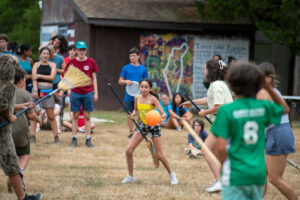
About 10 years ago, David Weiss, executive director of Habonim Dror Camp Galil in Ottsville, noticed a change in the camp’s bunks. Instead of the snickering and chatting he usually heard after lights out, there was silence. Kids were not cracking jokes or sharing secrets. They were scrolling on their phones.
Since then, Camp Galil has implemented a no-cellphone policy at camp.
“Summer camp, especially overnight summer camp, is a really intentional space that is apart from the rest of the world,” Weiss said. “It’s a space where you come together and for two weeks, four weeks, seven weeks, do things that really aren’t comfortable in any other setting. And part of that is being disconnected and away from the distractions of the outside world.”
Camp Galil isn’t the only Jewish summer camp following this philosophy. Many camps in the Greater Philadelphia area have banned cellphones and any technology with screens from camp premises. For the most part, the restrictions have been beneficial, camp management said.
“When we tell families this before the summer, parents always get very excited, and kids kind of roll their eyes,” said Rabbi Isaac Saposnik, executive director of Camp Havaya, a Reconstructionist sleepaway camp in Wyncote. “And when we talk about it with families and kids after the summer, we often hear kids talk about this being one of the highlights, that it really is the only time where they don’t have to be connected 24/7 like that.”
Saposnik has noticed that about a week in, campers stop the compulsive reach for their phone to snap a picture and start living in the moment. They look forward to writing letters to parents and friends back home.
Eliyah Eisenman, a 14-year-old from Plymouth Meeting, has spent summers at Camp Galil since 2018. There have been cellphone restrictions in place as long as she’s been a camper.
“I’ve never missed my phone,” Eliyah said.
“I mostly use my phone to communicate with friends and, because I’m constantly around my friends, there’s no need for it,” she added.
Though she finds it hard to fall asleep on the first night of camp without her phone, by the second night, she’s glad she’s phoneless.
When Eliyah comes home from camp, she finds it hard to text friends for about a month. She said she’d rather just call people. But by the end of the summer, she’s tethered to her phone once more.
Though cellphones are a relatively recent invention, there have always been distractions at summer camp. When Jordan Bravato, camp director at Camp Kef at the Kaiserman JCC, was a camper at the same camp he leads now, he brought his portable CD player to Camp Kef’s grounds.
“I remember being told by many, many counselors like, ‘Hey, you gotta put that away,’” Bravato said.
Distractions at camp aren’t just a 2023 issue. Whether it’s a CD player, Tamagotchi or iPhone, it’s always been the job of camps to regulate the presence of technology.
As smartphones and screens become more integral parts of daily life, camps are once again figuring out how to adapt.
“We know that this is getting harder and harder given how much kids are on their screens,” Saposnik said. “We know kids use devices for music, and they use it to read and they use it to take pictures.”
Camp Havaya recommended kids pack devices that don’t connect to the internet. For families who can’t afford these gadgets, the camp provides some.
Day camps, such as JCC Camps at Medford, offer STEM, or science, technology, engineering and math, programming, where kids can use robotics, computer coding or 3-D printing.
“They’re going to the lake, and then they’re going to archery or they’re going to the ropes course,” JCC Camps at Medford Director Sara Sideman said. “So it’s not in the entirety of their day. It’s just infusing it into their experience.”
The JCC Camps at Medford and Camp Kef have both created apps to send parents camp updates and photos regularly, including protected folders for photos of their children.
Implementing regulations on phone and technology use at camps isn’t camp leadership being ignorant of adolescent life. It’s an attempt to preserve a decades-long Jewish tradition of camp joy and camaraderie in a rapidly changing world.
“It’s not about trying to create some vision of what Utopia looked like five years ago, 10 years, 20 years ago,” Saposnik said. “But figuring out what is Utopia for our kids right now.”






